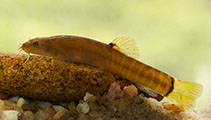| Family: |
Nemacheilidae (Brook loaches) |
| Max. size: |
5.53 cm SL (male/unsexed) |
| Environment: |
demersal; freshwater |
| Distribution: |
Asia: Sri Lanka. |
| Diagnosis: |
Dorsal soft rays (total): 11-11; Anal soft rays: 8-8. Schistura madhavai differs from all its congeners from peninsular India and Sri Lanka by the combination of the following characters: 8-9 wide post-dorsal bars separated by narrow, white interspaces ¼-? the width of the bars; black bar at the base of the caudal fin arched, its posterior margin vaguely indented at bases of branched caudal-fin rays 3 and 14, wider than the interspaces on the body; 8+8 branched rays on emarginate caudal fin; incomplete lateral line ending beneath the dorsal-fin base; axillary pelvic lobe absent; adpressed pelvic fin just reaching the anus; 7½ branched rays on dorsal fin; pelvic-fin origin on a vertical through the last unbranched dorsal fin ray; and suborbital flap in males absent (Ref. 116162). |
| Biology: |
Inhabits a small stream about 2 m wide, flowing through sparsely-inhabited tea plantations, at an
elevation of about 1000 m above sea level and with substrate consisting of pebbles and gravel. Prefers the faster-flowing areas of the stream. Occurs syntopically with the cyprinids Devario
malabaricus (Jerdon), Puntius titteya (Deraniyagala), Pethia nigrofasciata (Günther), Rasbora dandia (Valenciennes), Rasboroides rohani (Batuwita, Silva & Edirisinghe), and the osphronemid Belontia signata (Günther). The introduced guppy Poecilia reticulata Peters was also recorded from this stream (Ref. 116162). |
| IUCN Red List Status: |
Critically Endangered (CR); Date assessed: 07 August 2019 (B1ab(iii)) Ref. (130435)
|
| Threat to humans: |
harmless |
Source and more info: www.fishbase.org. For personal, classroom, and other internal use only. Not for publication.
